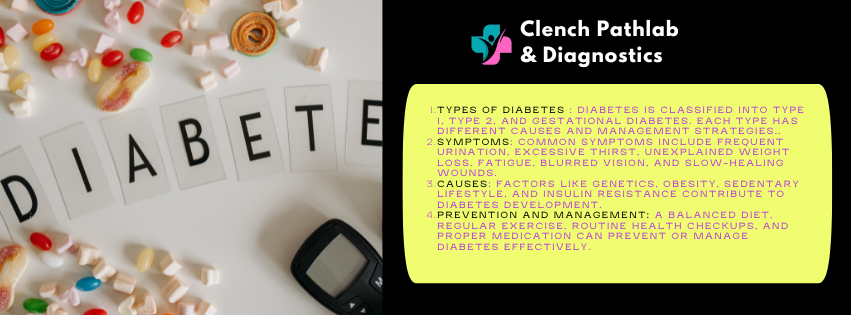Diabetes is a widespread health issue that affects millions globally every year. Unfortunately, many cases go unnoticed until serious complications develop. Regular diabetes checkups are essential to catch the condition early, manage its symptoms, and prevent long-term health consequences. Whether you are at risk or managing diabetes already, understanding the significance of routine checkups can help you take charge of your health.
This guide covers diabetes checkup including risk evaluations, diagnostic procedures, and identifying symptoms. Additionally, it provides insights into checkups tailored for Type 1, Type 2, and gestational diabetes, equipping you with the knowledge to make informed health decisions.
Why Are Diabetes Checkups Important?
Routine checkups for diabetes are not just about diagnosis; they are a cornerstone of proactive healthcare. Here’s why they matter:
- Early Detection: Identifying diabetes early on helps manage it effectively and prevent severe complications, such as kidney issues or nerve damage.
- Risk Evaluation: Regular checkups help individuals understand their likelihood of developing diabetes, especially if they have predisposing factors like obesity, a family history of diabetes, or high blood pressure.
- Treatment Monitoring: For individuals already diagnosed, checkups provide insights into blood sugar trends, enabling necessary adjustments to treatment plans.
Diabetes Risk Assessment
Understanding Risk Factors
A diabetes risk assessment identifies factors that increase the likelihood of developing the condition. Common risk factors include:
- Family History: Having close relatives with diabetes elevates your risk significantly.
- Age: Individuals over 45 are more prone to Type 2 diabetes.
- Lifestyle Choices: Poor eating habits, lack of physical activity, and obesity are major contributors.
- Medical Conditions: High blood pressure, high cholesterol, or conditions like PCOS increase diabetes risk.
Tools for Risk Assessment
- Self-Assessment: Lifestyle and symptom-related questionnaires can provide an initial risk evaluation.
- Blood Tests: Tests like fasting blood sugar and HbA1c give accurate data about glucose levels over time.
Diabetes Screening
Screening involves tests to detect elevated blood sugar levels, often before symptoms develop. It is particularly crucial for high-risk individuals.
Key Screening Tests
- Fasting Blood Sugar (FBS): Measures glucose levels after 8+ hours of fasting. A reading over 126 mg/dL indicates diabetes.
- HbA1c Test: Reflects average blood sugar levels over the past 2-3 months. A result of 6.5% or more suggests diabetes.
- Oral Glucose Tolerance Test (OGTT): This test evaluates the body’s glucose processing and is used frequently in pregnancy.
- Random Blood Sugar Test: Can diagnose diabetes at any time, irrespective of meals.
Who Should Get Screened?
- Adults aged 45 and above
- Individuals with a BMI over 25
- Pregnant women (to screen for gestational diabetes)
- People with conditions like high cholesterol or hypertension
Recognizing Diabetes Symptoms
Symptoms of High Blood Sugar
- Increased thirst
- Frequent urination
- Fatigue
- Blurred vision
- Slow-healing wounds
Symptoms of Low Blood Sugar
- Sweating
- Shaking
- Dizziness
- Confusion
Diabetes Symptoms by Group
- Men: Erectile dysfunction, reduced muscle mass
- Women: Yeast infections, irregular periods
- Children: Bedwetting, irritability, unexplained weight loss
Recognizing these symptoms early allows timely diagnosis and intervention.
Type 1 Diabetes Checkup
Type 1 diabetes is an autoimmune disorder requiring lifelong management.
Tests for Diagnosis
- Autoantibody Tests: Detect immune system attacks on insulin-producing cells.
- C-Peptide Test: Measures the body’s insulin production levels.
Why Early Detection Matters
Identifying Type 1 diabetes early prevents complications like diabetic ketoacidosis (DKA), a potentially fatal condition.
Type 2 Diabetes Checkup
Type 2 diabetes, often linked to lifestyle factors, is the most prevalent type.
Common Tests
- HbA1c Test: Tracks long-term blood sugar levels.
- Fasting Blood Sugar Test: Measures glucose levels after fasting.
- OGTT: Evaluates how the body processes glucose.
Post-Diagnosis Lifestyle Changes
- Healthy Eating: Opt for nutrient-rich foods and limit processed sugars.
- Regular Exercise: Engage in activities like walking, swimming, or yoga.
- Blood Sugar Monitoring: Regular checks help maintain glucose within a healthy range.
Gestational Diabetes Checkup
Gestational diabetes occurs during pregnancy, affecting both mother and baby.
Screening Methods
- Glucose Challenge Test (GCT): A preliminary test that involves drinking a glucose solution and measuring blood sugar levels.
- OGTT: A confirmatory test following abnormal GCT results.
Why It’s Crucial
Untreated gestational diabetes can lead to complications, including preeclampsia, preterm labor, or high birth weight in babies.
Managing Diabetes Post-Checkup
Treatment Approaches
- Medications and Insulin: Prescribed based on the type and severity of diabetes.
- Lifestyle Adjustments: Eating whole grains, lean proteins, and avoiding sugary foods aids in blood sugar control.
Regular Monitoring
Using a glucometer, track your daily blood sugar levels to maintain a healthy balance.
Conclusion
A diabetes checkup is a vital step in managing or preventing diabetes. Regular screenings, risk evaluations, and symptom awareness can make a significant difference. Whether you’re managing Type 1, Type 2, or gestational diabetes, timely interventions can lead to a healthier life.
Read More Blogs: Typhoid Report Positive
Frequently Asked Question
- What does a diabetes checkup include?
It includes evaluating risk factors, performing blood tests, and reviewing symptoms for diagnosis and management. - When should I get a diabetes checkup?
Screening is recommended if you are over 45, have a family history of diabetes, or show symptoms like frequent urination or unexplained weight loss. - Can diabetes be prevented?
While Type 1 diabetes cannot be prevented, Type 2 diabetes risk can be minimized through healthy lifestyle choices. - Does gestational diabetes go away after pregnancy?
Yes, but it increases the risk of Type 2 diabetes later in life. - How often should blood sugar levels be checked?
Frequency varies by individual but ranges from daily to weekly, depending on the treatment plan.
